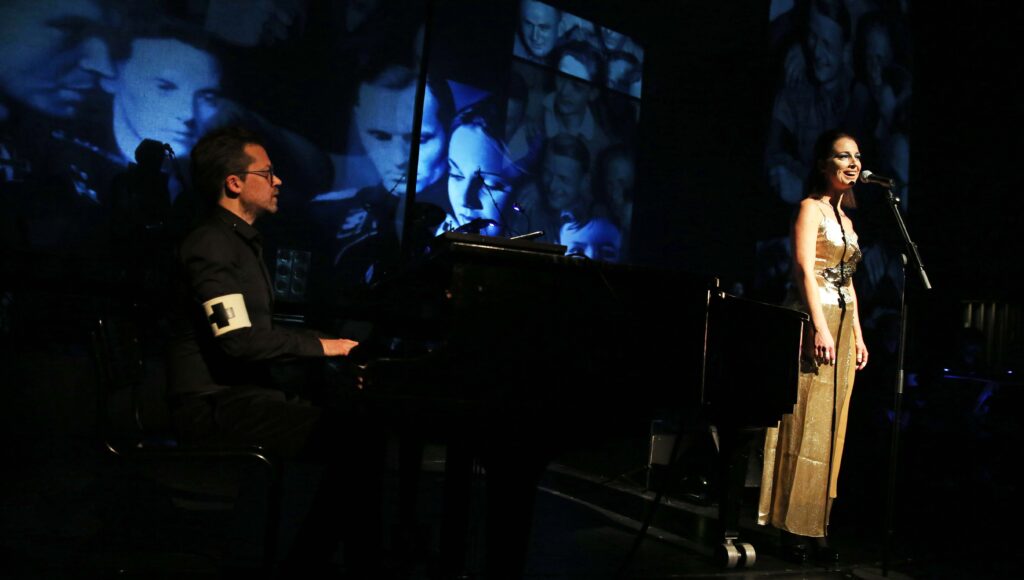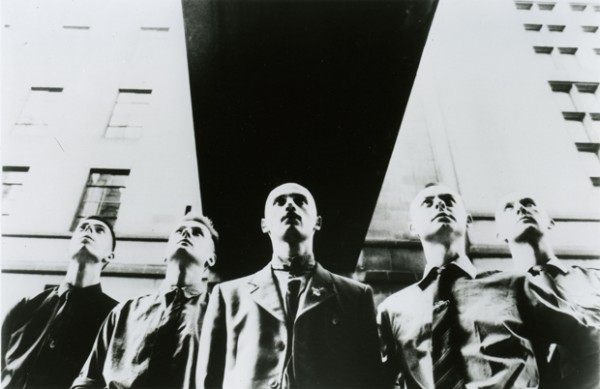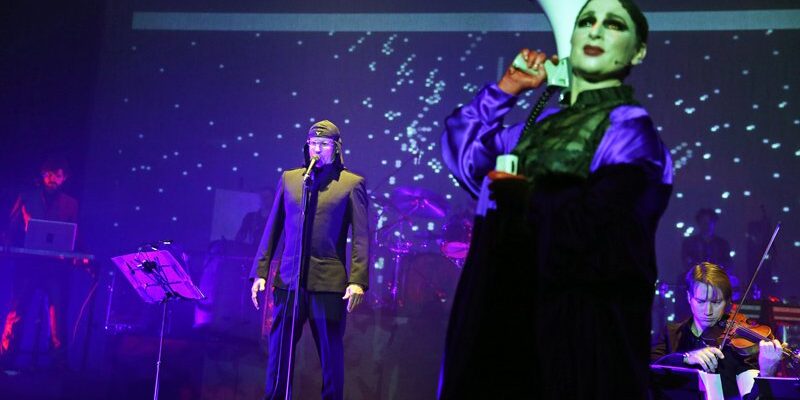The Slovenian avant garde music group Laibach talks to Tom Mustroph about their show Wir sind das Volk, based on the work of Heiner Müller, the relationship between the military, music and theatre, and the art of provocation
The Slovenian band Laibach once withstood oppression in Yugoslavia. Now, with their show Wir sind das Volk at HAU Berlin, which was originally produced two years ago, they have had to contend with Covid and the replacement of some of the band members. As is customary with Laibach, this interview was conducted via email.
Tom Mustroph: Your decision to name yourself ‘Laibach’, the German name of Ljubljana, has had diverse reactions over the decades. Now German reports on the war in Ukraine are using the name Lemberg, instead of Lviv. How does that sound to you? Do the names Lemberg and Laibach carry a historical burden?
Laibach: We don’t know that much about Lemberg, but – as you are probably aware – the territory of Slovenia was historically for many centuries part of Austrian and later the Austro-Hungarian empire, which means that Ljubljana and most of [modern] Slovenia were also part of German cultural domination for a long time. The name ‘Laibach’ was one of the original historic names for the capital city and in German speaking parts of Europe it is occasionally used even today, the a same way as Slovenians are still using Slovenian names for Vienna (Dunaj), Villach (Beljak) or Klagenfurt (Celovec), although they are completely different from the Austrian versions.
After the the Second World War, the name Laibach was suddenly condemned, more or less only because it was German. So, we started to use it as our own name, as we don’t like things to be condemned just like that. Plus, it gave us the necessary – and also quite precise – undertone for what we were doing. An important Slovenian philosopher, playwriter and literary historian Taras Kermauner wrote in his essay on Laibach in 1983 (in Nova revija magazine), that using the name Laibach was the most explosive and Dadaistic invention in the poetics of the group.
Tom Mustroph: When I look back at what I understood of Laibach, there was often a joyful playfulness with uniforms and with military symbols. It sometimes seemed strange, often provocative.
Laibach: It’s quite funny, you know, but most of the times we didn’t really wear military uniforms; it is only what people have seen in us, or actually wanted to see. It is true that we did our first European tour in 1983 – called the ‘Occupied Europe Tour’– travelling through East and West Europe, dressed in Yugoslav military working uniforms – but that was because Yugoslavia was non-aligned as a country and did not belong to the Warsaw pact or NATO. Wearing Yugoslav army uniform was a message, that we do not stand on any of the sides, but also, we wanted to draw the parallel between military music formations and pop-rock bands. Rock and pop music in principle comes from the long tradition of military music and this is still possible to see very clearly in North Korea, where all the pop bands are acting as military combos. If you remember back in the 1960s all the bands – including the Beatles, the Animals, and the Rolling Stones, were also wearing uniforms, as a clear sign of military formation.
Laibach was later dressed in uniforms only once again, and that was for the sake of a photo session and making of a video for the album WAT, which was dealing with the winners and defeaters of the Second World War. All other our ‘uniforms’ were just plain civilian clothes, hunting, mountain or skiing clothes.
We also used hardly any military symbols, except the swastika, which is – let’s admit it – in most civilisations more a spiritual than a military symbol. But yes, we used the modified German swastika, that we took from the great anti-Nazi artist John Heartfield, with a very clear intention of course. Our historic symbol ‘the cross’ is not specifically and originally military symbol at all. And just to make it clear – there’s nothing wrong in being provocative per se. Art used to be nothing but provocative. Being provocative was the imperative for good theatre and good music or a film or a book. Suddenly provocative has this derogatory meaning. When did that happen? Should art now be completely politically correct, odourless, tasteless and characterless?
Tom Mustroph: In these days, where there is a call to the arms for Ukraine, which kind of symbols would be useful or in the spirit of Laibach? Would it still be military outfits or do we need to turn around because Europe turned around?
Laibach: We don’t think Europe turned around – we need to be precise here: most of Europe a is part of military alliance, NATO, and interfering in Ukraine would dramatically expand this war. This would be a very dangerous game and Ukraine was unfortunately a bit naïve in its expectations about NATO stepping in. But, in all other aspects, European countries – except of course Hungary – are showing and practicing full humanitarian support to Ukraine. Nothing is ‘useful’ for Laibach in relation to this war and we are not trying to make any kind of profit out of it. It is difficult enough that we have predicted it back in 2014 (in Iron Sky – The Coming Race). We had to cancel our Russian concerts, but we will do them as soon as we can. And we would do shows in Ukraine as well as soon as possible, if they want us.
We are condemning this war, we feel sorry for all the victims, especially kids, animals, helpless and elderly people, but they should not expect Laibach to wave around Ukrainian flags and other patriotic symbols. There is no need for us to change because of this war; we should stay exactly as we are.
Tom Mustroph: One strong appeal Laibach had in the past was the re- or de-contextualization of symbols, be it the translation of Queen’s song One Nation into a German version Geburt einer Nation, your North Korean tour as a western rock band and the Fliegerlied (The Song of the Airmen) of Hans Albers in your current show Wir sind das Volk. Given the current air bombing of Kiev, do you still use the images of airplanes? Which new layer of content, but also of misunderstanding may it produce?
Laibach: This show Wir sind das Volk was not created with the image of bombing Kyiv or the war in Ukraine in our heads; it’s a project about Heiner Müller and his bellowed Germany that he bombed with his works and denazified intensely through all of his life. Therefore, there is no reason to change any parts – unless the performers are getting ill. And specifically, the song of Hans Albers from the Second World War was re-contextualised with aim to remind about the horror of every war, including the current war in Ukraine. We couldn’t be more subtle and relevant than that.

Laibach’s Wir sind das Volk. Photo: Dorothea Tuch
Tom Mustroph: What is the situation in Slovenia like for you in terms of finance and atmosphere?
Laibach: The Slovenian state/Ministry of culture does not finance Laibach. We finance ourselves, from our shows and other income, which – in the given circumstances – is not that easy at the moment. But atmospherically, the situation in Slovenia is, in principle, OK.
Tom Mustroph: What is left from the industrial neighbourhood and the concrete plant, whose dust and noise must have influenced your early music? Does the nice Ljubljana of today still challenge you?
Laibach: The industrial area and factories in our hometown Trbovlje, where we started back in the 1980s. did influence our music and our aesthetics back then, but you can’t expect from us that we only do concrete and ambient music of the environment where we live. Nowadays we have different preferences and other challenges that are beyond Ljubljana’s atmosphere only, and also transcend strictly industrial aesthetics.
Tom Mustroph: From where else did you get your energy, your anger?
Laibach: Anger? We don’t practice anger; we are not a punk band, and we are also not 18 years old anymore, to be driven only by energy. We are disciples of Marcel Duchamp and Jacques Tati and if anything, we can get very angry if people don’t get that.
Tom Mustroph: Is the industrial sound nowadays rather the stuff of museums, kind of neo classic, not really streetwise?
Laibach: It may really not be as ‘streetwise’ as some other music, but industrial sounds are still ‘all around’, and industrial music is relevant as a genre, aesthetic and philosophy, that is developing through different stages and goes in different directions. Industrial music is much more than just few noise samples put together in a never-ending repetition.
Tom Mustroph: To which state do you belong, to Slovenia or to the NSK, the state Laibach founded in 1991? And why?
Laibach: We are based in Slovenia, we created the NSK State, but we don’t belong to one state only – we belong to all of them. Why? That is how it is with Laibach. We cannot be owned as a kind of private property. We are millions and millions are one.
Tom Mustroph: NSK state is even smaller than Slovenia, in territory and also in population. Where is the beauty in small states, and where is the danger?
Laibach: It is smaller than Slovenia, but – in the numbers of its citizens bigger than the Vatican. NSK state actually has no territory, it has all the territory. It is the state of the Universe. Its beauty of course lies in the eyes of its citizens.

Laibach in 1989
Tom Mustroph: You have said you like the fragmented Balkans. Are things now better than in the old Yugoslavia?
Laibach: The Balkans were always fragmented, even in the time of Yugoslavia. That was its character and its quality. We never said that now is better than before, we only accept it as it is. Yugoslavia was a good country, maybe even too good to survive.
Tom Mustroph: Coming back to Wir sind das Volk: What do the texts of Heiner Müller bring to you? Some of them exist already longer than your band exists, so why so late this encounter, and what did you discover with those texts?
Laibach: We discovered that is never too late for Heiner Müller. His texts are immortal, and so is Laibach. We actually knew about Müller since the beginning of 80s. Back in 1984, when Laibach was basically forbidden in lovely Slovenia, we were asked to compose music for Heiner Müller’s Quartet – based on of Choderlos de Laclos’s 1782 epistolary novel Les liaisons dangereuses – a play that was presented at the Slovenian National Theatre in Ljubljana, directed by young director Eduard Miler. Which we did. In February 1985, we met Heiner Müller in Berlin by coincidence and it turned out that he was very enthusiastic about Laibach and he also proposed that we collaborate on one of his upcoming theatre productions. Unfortunately, that did not happen (in the meantime we were invited by another legendary theatre and artistic director – and Heiner Müller’s opponent, Peter Zadek, to work on Macbeth in 1987, staged at the Deutsche Schauspielhaus in Hamburg, directed by Wilfried Minks), but we were told that Heiner Müller had apparently used some of our music in a theatre production that he later worked on.
A few years ago, in 2019, we finally received an invitation from Anja Quickert, the head of Internationale Heiner Müller Gesellschaft, and she proposed a project, based on his texts, and lyrics to be premiered and performed subsequently at the HAU in Berlin. Today we are concluding the seventh show in HAU with this project, we performed twice in Ljubljana and opened the Klagenfurt Festival last year with this project, and now we still have a big show in Zagreb ahead, followed by more shows in Ljubljana, Hamburg, Maribor and Novi Sad. In total we did and are still doing 15 shows with Wir sind das Volk in these difficult Covid circumstances, and approximately 9000 – 10000 people will see it, which is quite OK for such project.
Tom Mustroph: In recent years you contributed to a lot of theatre productions. Did you see that as an increase of range and importance (although concerts usually have bigger audiences than theatres)? And how was it for you, to contribute to them, and, in the worst cases, to be used in the art of others?
Laibach: In fact, we contributed to many theatre productions since the mid 1980s. For us it is just a different field of operation, a different context, and a different audience. As we are constantly using the work of many other artists, we also can’t get too sensitive if we are used for the art of others, but in theatre productions we are usually involved in more than just the music.
Tom Mustroph: Some years ago, when you played at Volksbühne Berlin, you said in an interview, that the bands Rammstein and Laibach play in the same fields, with the difference being, that Rammstein is Laibach for kids, whereas Laibach is Rammstein for adults. Do you still agree?
Laibach: Well, in the meantime their audience have grown up and Rammstein are now a conventional stadium rock band, so we’d say that they are now Laibach for adults and Laibach are Rammstein only for the ignorant.
Tom Mustroph: How much of the show Wir sind das Volk did you change in comparison to the first version two years ago? And which of these changes were due to Milan’s illness, what due to normal artistic development and what was due to the political situation, especially the war in Ukraine?
Laibach: We did some changes, partly because this project is evolving from show to show and partly because of the absence of the main vocalist, and later also one of the two actresses, who were missing due to illness. None of the changes were done due to political situation and the war in Ukraine. Laibach is not an activist political group and Wir sind das Volk is a project about Heiner Müller and Germany in the first place. But all other countries can easily identify with it as well if they wish.
Tom Mustroph: I would imagine that the political situation kind of recoded and reshaped the show. Do you have that impression?
Laibch: Yes, different contexts always bring new readings, and now time is indeed completely fragmented and calls intensely for a new and logical search for meaning, and thus for a new reading of history and of everything that exists.
For information about Laibach’s upcoming shows, visit Laibach.org
Tom Mustroph works in Berlin and Palermo as a freelance journalist and dramaturg. He operates in several journalistic fields, such as theatre, fine arts and sports. He is most interested in how self-responsible work can succeed elegantly and in accordance to minimal moral standards. He collaborates with several German language publications such as taz, FAZ, Neues Deutschland, NZZ, Theater der Zeit, zeit online, Deutschlandfunk and WDR.








